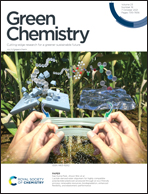Bio-based poly(ester-alt-thioether)s synthesized by organo-catalyzed ring-opening copolymerizations of eugenol-based epoxides and N-acetyl homocysteine thiolactone†
Abstract
The anionic alternating ring-opening copolymerizations of three bio-based aromatic monomers, eugenol glycidyl ether (EGE), dihydroeugenol glycidyl ether (DEGE) and vanillin glycidyl ether (VGE), were carried out with renewable N-acetyl homocysteine thiolactone (NHTL) using benzyl alcohol and 2-tert-butylimino-2-diethylamino-1,3-dimethylperhydro-1,3,2-diazaphosphorine (BEMP) as the initiating system. This polymerization is a rare example of synthesis of linear polyesters using eugenol-based monomers. Alternating poly(ester-alt-thioether)s are obtained with number-average molar masses (Mn) ranging from 1.1 to 10.8 kg mol−1 and dispersities as low as 1.20. The copolymer structures were carefully characterized by 1H, 13C, COSY, HSQC, and 1H–15N NMR. It was found that the alternating copolymers were obtained selectively at different monomer feed ratios. In addition, the use of EGE and VGE monomers allows the preparation of multi-functional poly(ester-alt-thioether)s respectively bearing allyl or aldehyde groups in each repeating unit. The copolymers display only clear glass transition temperatures higher than the ambient temperature. This alternating copolymerization method offers a new chemical pathway for the valorization of bio-based aromatic compounds and expands the scope of renewable polyesters.



 Please wait while we load your content...
Please wait while we load your content...